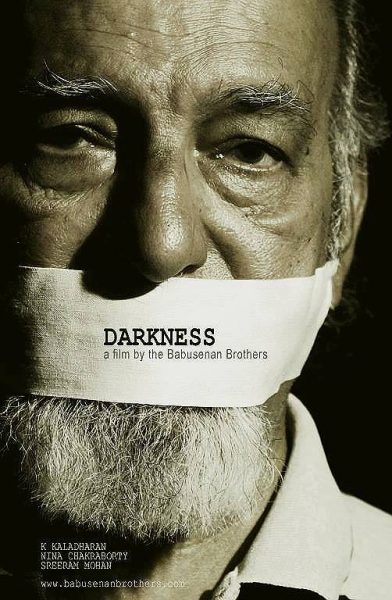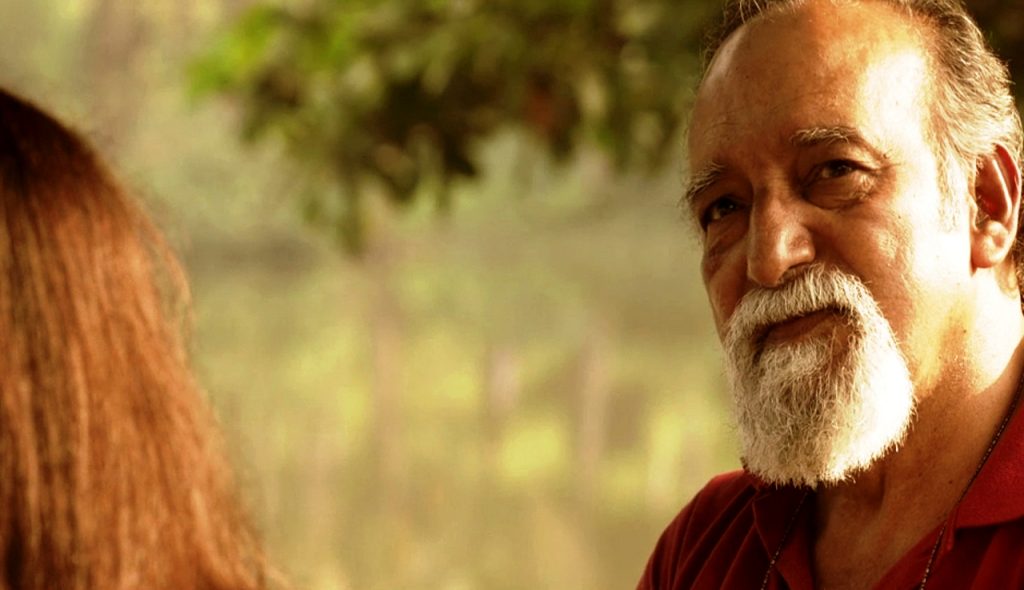Darkness is a metaphor for the depressing reality of the world we live in and are living in at the present time. It is a totally out-of-the-box film created by the Babusenan Brothers, Satish and Santosh. They entered into filmmaking in Malayalam, their mother tongue, some years ago and have since given us films that are a class unto themselves.
Darkness is a powerful political film presented through the character of a retired university professor, Ramdas (K Kaladharan). He is a left leaning liberal thinker who writes weekly articles on social and political issues close to his heart for a Left-leaning magazine. He lives alone in a beautiful house, fills his hours tending to his garden religiously and an aquarium that forms part of the garden. Ramdas has just two friends: Krishnan, the editor of the Left-wing magazine and Alex, its young designer. His slightly tedious life is often dotted with threatening telephone calls from an anonymous Hindu Right member who commands him either to stop writing secular articles or to be prepared to stop writing forever. Ramdas does not bend, nor do we find him getting scared. The invisible caller rebukes Ramdas for talking in English and Ramdas hits back saying he cannot speak Hindi. These are tiny touches that reveal the political leanings of the caller.
Nilima Chatterje (Nina Chakraborty), a research scholar at the JNU, a daughter of mixed parents, the mother a Malayalee and the father Bengali, steps into his life to do a series of interviews for her research. The major footage of Darknessis comprised of this long dialogue between the professor and the young Nilima who speaks both languages fluently. The entire focus of this character-driven film is on Ramdas as it is his story. We learn that he was once an active member of a Left party where he had a close friend who later defected and is currently the Home Minister.
The best quality of the film lies in two things – firstly, the portrayal of Ramdas, fleshed out beautifully by Kaladharan, a regular in Babusenan productions and an excellent actor. Ramdas is a progressive and secular individual who is neither aggressive nor violent. But he has his misdemeanours too. His college career is marred by the scandal of an ‘affair’ with a much younger colleague. His son, Kabir, so-named because Ramdas is fond of Kabir’s writings, cuts off from his father because of this scandal and cuts away his little girl from her grandfather. But that does not stop him from coming to father with a begging bowl every now and then yet making it sound like a command. A point here though. The cameo characters are introduced more as props to flesh out the character of Ramdas and while they serve the film’s purpose well enough, a little more depth here would have been in point.
Secondly, the film scores with the very topical and contemporary political context the story is placed in amidst the killings of Kalburgi, Dhabolkar, Gouri Lankesh and Govind Pansare for their staunchly secular ideologies and their persistent fight to establish secular and rationalist ideologies among the masses. Ramdas is a lightly sketched blend and a microcosm of these powerful personalities. This gives the film a feel of the real, of relating to something that is so tangible that a sensitive viewer might want to stretch his/her arm and touch the feeling if that was possible. True, these killings happened in neighbouring Karnataka State and the location in this film is shifted to Thiruvanthapuram with a Leftist government in power but that is precisely what gives an extra edge to the context and narrative of Darkness. In placing Kerala as the backdrop and Thiruvananthapruam as centre-stage, the film points out the stark contrast between the Hindu Right threatening a liberal Leftist thinker within a Left-ruled government with impunity.
By the time the film closes, we know how it will end. The closing shot is a play-out on the sound-track of Rabindranath Tagore’s poem “Where the mind is without fear and the held is held high” in the voice of the seven-year-old Ramdas at his school function while the camera pans up to focus on the school building. Darkness is a political film that makes several bold yet relevant statements. But it is also a fictionalized biography of a committed thinker who is not afraid of the threats he faces on a day-to-day basis.
The technicalities embellish the film even further. The cinematography is beautiful, capturing the finer nuances of the title Darkness. The darkness stands for the dark, anonymous and mysterious enemy, the caller. It also stands for the darkness of ignorance that threatens and even kills a rational man only because he is secular and rational and fearless. The editing (Vijil FX) is simple and languid, in keeping with the quiet ambience and pace and rhythm of the film. The art direction is as straightforward as the film itself – Ramdas’ sparsely but scrupulously clean house, the well-tended garden and the familiar locations of Thiruvananthapuram. The evocative sound design (Anand Babu) complements the story telling perfectly while the music (Santosh K Thampi) is subtle, low-key and suitably mood-centric. One song at the party is beautifully sung in Malayalee-accented Hindi.
Darkness is symbolic of the political turbulence of Hindu fundamentalism the country is living within in recent times thereby making it one of the most powerful and relevant celluloid statements within not just contemporary Malayalam, but Indian cinema in recent times.
Malalayam, Drama, Color



